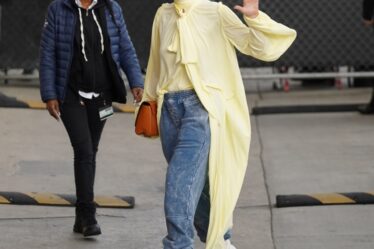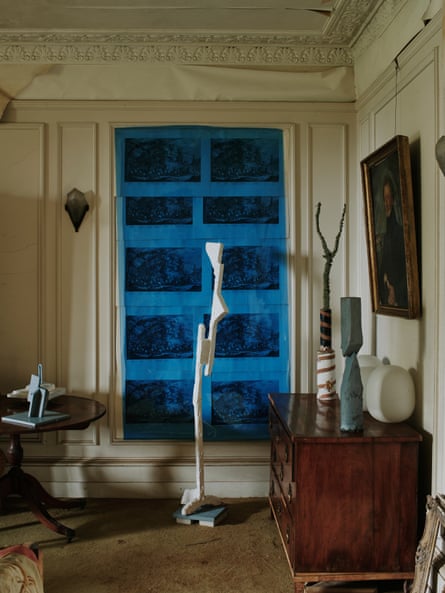
I’m still getting used to this. It’s quite disconcerting,” says Carla von der Becke, looking up at an assemblage of agricultural tools – hefty saws included – hanging around a rustic chandelier in the kitchen of her home in the South Downs. The perilous-looking arrangement is the latest intervention here, in the house Carla grew up in, by her friend the South African artist HelenA Pritchard (who intervened in her own name to add the “A” in at the end).
The two women met a decade ago through mutual friends in the art world – Carla is co-director of London-based PR agency Albany Arts – and HelenA had occasionally been a visitor to the house when Carla was staying with her parents. Then, early in 2021, Carla’s mother died “quite unexpectedly. She had been caring for my dad, who has dementia, so then I was here caring for him, and it was quite intense…” It was at this point that HelenA offered to come and stay for a longer spell. “Carla didn’t have any help, she was doing everything herself and I thought she might just need a friend. And I love getting out into the country.”
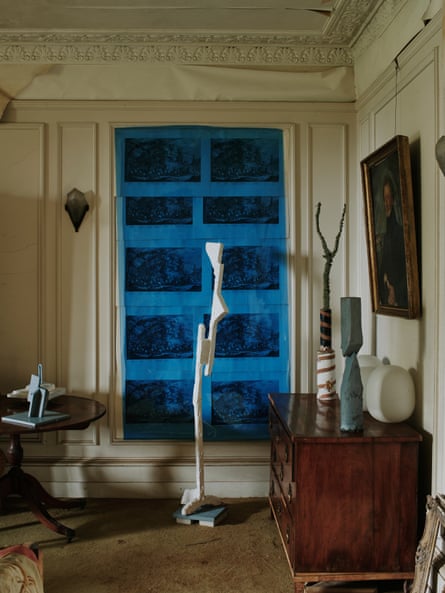
The house, which Carla’s parents bought in 1974 and whose oldest part was built in 1690, proved fertile ground for HelenA’s penchant for working with discarded or overlooked material, for “reconfiguring things”, as she puts it. Tiles left over from when a swimming pool was built years ago have found their way into some of her sculptures, for instance, as have the contents of decades-old tins of Farrow & Ball paint. In her makeshift studio in one of many ancient-looking outbuildings, where a copy of Waiting for Godot lies among other seemingly timeless accretions on the floor, she prises open a tin of calamine pink. “Some of the paint is almost hard, so I can use it in a sculptural way,” she says. “I love then walking around the house and thinking ‘Eureka! – I’ve found where they’ve actually used this colour!’” She likes that it’s a “continuation of something, so it’s not necessarily about what the finished work is, it’s the materials and their history that’s important.”
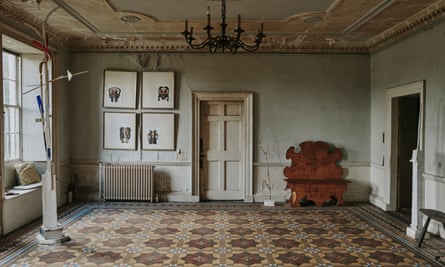
For Carla, this is in many ways a continuation of the way her parents lived in the house. “It was quite a magical place to grow up,” she says. “My dad did a lot of work outside and we had animals. He built a darkroom and made furniture, my mother was painting… It was always very creative.” Her father, Bernhard, is a former print dealer whose family business in Germany, set up in 1931, specialised in the prints of Käthe Kollwitz. Meanwhile, her Czech-born mother, Blanka, had worked with artists at Artia, a publishing house in Communist-era Prague best known for its illustrated books of fairytales.
Evidence of their creativity is visible in every room of the house. A pair of beautifully carved benches in the entrance hall were made by Bernhard to a design by Blanka, based on an example she saw in the Elizabethan Tower at Sissinghurst. On the Adam-style mantelpiece, a photograph by Bernhard of Blanka as a young woman is breathtakingly painterly in its composition and tones. Delicate pink roses handpainted on to the panelling of a green bathroom upstairs are her work – the flowers taken from a pair of antique mugs now found in the drawing room.
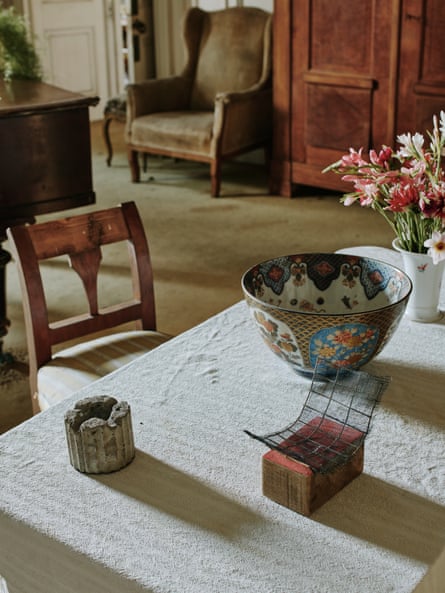
When you’ve inhabited a place for long enough, it takes fresh eyes to re-evaluate the all-too-familiar things you stop seeing for yourself. With Carla’s blessing, HelenA has relished that role here – whether constructing ephemeral sculptures from a pile of old books topped with an upside-down lampshade or taking rubbings from the latticed fingerplate on a drawing-room door (partly inspired, she explains, by Roy Lichtenstein’s “Entablatures” series). She was most nervous about incorporating some of Bernhard’s stock of reproduction prints into her work but, as she says, “It brings things to life again, otherwise they’re just sitting there.” Carla agrees. In the hall, hanging near one of Bernhard’s Sissinghurst benches, is a quartet of framed works in which HelenA has painted over some flower prints, then folded each paper in half so that they resemble Rorschach blots – but also, as it happens, the baroque curves of the nearby bench. “So much here filters into what I’m doing,” HelenA observes.
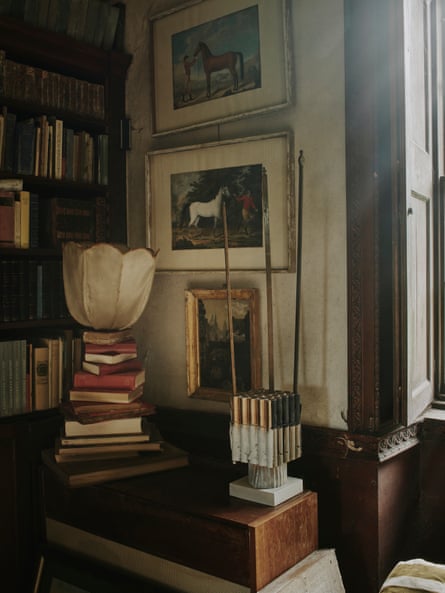
Other artists before her, including the photographer Richard Learoyd, have responded to the particular atmosphere of this house; but HelenA’s extended stay – and an exhibition of her work which she and Carla staged on-site – have encouraged Carla to launch a (slightly) more official residency programme, drawing too on her years of experience in the art world. Scottish artist and filmmaker George Finlay Ramsay is next to arrive and the house will no doubt offer up different angles and textures for his lens – yet all in the spirit of “the continuation of something”. When HelenA arrived “I was at a bleak moment in my life,” Carla says, “and then someone bringing in new energy – and hopefulness…” She trails off. It’s easy to talk about the transformative power of art, but in this quiet, domestic setting, that power is plain to see.
For more information, see: nurstedresidency.com; helenapritchard.com; @helena_pritchard.
This article originally appeared in inigo.com

